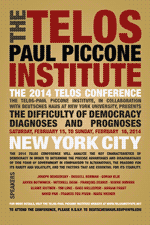Luigi Sturzo (1871–1959) was an Italian priest, social reformer and the founder in 1919 of the Popular Party that later became the Christian Democratic Party, and social theorist who wrote extensively about history during the last century. Regarding history, Sturzo’s great contribution is his account of the formation and development of the “International Community” as one of the concrete forms of human society subject to its general laws. Sturzo locates the roots of this concept in the Christian revelation of human equality before God and the subsequent religious duty to love one’s neighbor in a manner that transcends the traditional boundaries of the ancient world. Thus the social values of the pre-Christian world are inverted, and human personality assumes the mantle previously held by the social and ethnic bonds of that era.
|
The following paper was originally prepared for the Eighth Annual Telos Conference, held on February 15–16, 2014, in New York City. |
||||
|
Telos Press Publishing · PO Box 811 · Candor, NY 13743 · Phone: 212-228-6479 Privacy Policy · Data Protection Copyright © 2025 Telos Press Publishing · All Rights Reserved |
||||
 In this paper, I will try to show the positive potential of religion for democracy in light of some theoretical and practical considerations. At the theoretical level, a debate on the proper relation of religion to politics has taken place between certain “liberal” political theorists who are suspicious of religion for good historical reasons and a number of Christian authors who argue that religion can enrich our public life.[1] One such author, David Hollenbach, S.J., bases his argument on an approach to the common good—defined in Catholic teaching as “the sum of those conditions of social life which allow social groups and their individual members relatively thorough and ready access to their own fulfillment”[2]—that he discerns at the Second Vatican Council (1962–65) and calls “dialogic universalism.”[3]
In this paper, I will try to show the positive potential of religion for democracy in light of some theoretical and practical considerations. At the theoretical level, a debate on the proper relation of religion to politics has taken place between certain “liberal” political theorists who are suspicious of religion for good historical reasons and a number of Christian authors who argue that religion can enrich our public life.[1] One such author, David Hollenbach, S.J., bases his argument on an approach to the common good—defined in Catholic teaching as “the sum of those conditions of social life which allow social groups and their individual members relatively thorough and ready access to their own fulfillment”[2]—that he discerns at the Second Vatican Council (1962–65) and calls “dialogic universalism.”[3] 

